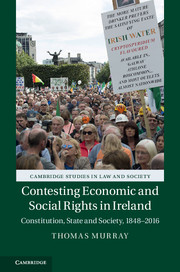Book contents
- Frontmatter
- Dedication
- Contents
- Acknowledgments
- Introduction: The Politics of Economic and Social Rights
- 1 Constitution ‘from Below’ in Ireland: 1848–1922
- 2 ‘Not Alone Personal Liberty but Economic Freedom’: Socio-economic Rights in the Making of the 1922 Irish Free State Constitution
- 3 ‘Highly Dangerous’? Socio-economic Rights in the Making of the 1937 Irish Constitution
- 4 Contesting the Irish Constitution and the World-System: 1945–2008
- 5 The Polarities of Justice and Legal Business
- 6 Contesting Property Rights
- 7 Contesting Trade Union Rights
- 8 Contesting Family, Education, andWelfare Rights
- 9 Reproducing the Value-Consensus State
- 10 Constitution ‘from Below’ in Ireland: 1945–2008
- Conclusion: Contesting Economic and Social Rights Today
- Bibliography
- Index
9 - Reproducing the Value-Consensus State
Published online by Cambridge University Press: 05 August 2016
- Frontmatter
- Dedication
- Contents
- Acknowledgments
- Introduction: The Politics of Economic and Social Rights
- 1 Constitution ‘from Below’ in Ireland: 1848–1922
- 2 ‘Not Alone Personal Liberty but Economic Freedom’: Socio-economic Rights in the Making of the 1922 Irish Free State Constitution
- 3 ‘Highly Dangerous’? Socio-economic Rights in the Making of the 1937 Irish Constitution
- 4 Contesting the Irish Constitution and the World-System: 1945–2008
- 5 The Polarities of Justice and Legal Business
- 6 Contesting Property Rights
- 7 Contesting Trade Union Rights
- 8 Contesting Family, Education, andWelfare Rights
- 9 Reproducing the Value-Consensus State
- 10 Constitution ‘from Below’ in Ireland: 1945–2008
- Conclusion: Contesting Economic and Social Rights Today
- Bibliography
- Index
Summary
The Constitution is a constitution of the people expressing principles for its society. It sets the norms for the community. It is a document for the people of Ireland, not an economy or a commercial company.
– Judge Susan Denham, 2001No distinction has ever been made between living and dead property owners.
– Judge Adrian Hardiman, 2005Socio-economic rights judgments, according to the professional ideology of the judiciary, were based primarily ‘on the facts’ of the case. From counsels’ presentation of these facts, the judges discerned central questions or issues to be resolved authoritatively and then looked to ‘apply the law’ as established in the 1937 Constitution, in statute or in precedent. Few judges or lawyers would regard this ordered progression from conflict to truth as mechanical. Judges had to choose between the competing precedents, principles, and ‘tests’ offered by counsel. They also had to decide how much and what kind of ‘context’ was necessary to constitute the ‘facts’ of the case or to substantiate their judgment. A range of interpretive choices had to be made, including interpreting the ‘letter’ and ‘spirit’ of the 1937 Constitution. Jurists similarly engaged with these judgments by identifying a weak line of reasoning or an ignored mode of interpretation and then proceeded to argue that an alternative principle or precedent may have produced a different, more favourable outcome. Jurisprudential positions on socio-economic rights, however, remained within certain parameters.
The critical analysis of judicial discourse in the preceding socio-economic rights cases demonstrates the prioritisation of principles over politics, of the immutable over the transient, of an imagined ‘value-consensus’ community over social forms of exploitation, oppression, and conflict. Value-consensus discourse may be described as an expression of a deeply embedded belief in the rule of law, as abstract and transcendent, objective and just, placing beyond question the question of judicial legitimacy in a coercive social order. This form of discourse represented the state as a consensual, value-neutral framework through which competing interests could be resolved. Conversely, oppositional understandings of the state represent it as being controlled by (or predominantly defending the interests of) the dominant power group in society. Irish judges (re)produced this discourse when promoting as transcendent, objective, and just the 1937 Irish Constitution (which, as we earlier established, registered a set of particular economic interests and power relations).
- Type
- Chapter
- Information
- Contesting Economic and Social Rights in IrelandConstitution, State and Society, 1848–2016, pp. 271 - 292Publisher: Cambridge University PressPrint publication year: 2016



